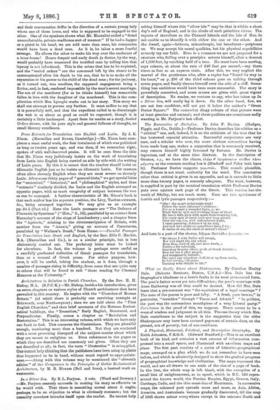Prose Extracts for Translation into English and Latin. By J.
E. Nixon. (Macmillan and Bowes, Cambridge.)—Mr. Nixon here com- pletes a most useful work, the first instalment of which was published as long as twelve years ago, and was then, if we remember right, spoken of with well-deserved praise. It will be seen from the title that Mr. Nixon very judiciously insists on the work of translating from Latin into English being carried on side by side with the writing of Latin prose. By this it is meant that the teacher should insist on idiomatic English just as he insists on idiomatic Latin. Yet masters often allow slovenly English when they are most severe on slovenly Latin. After some thirty pages of "general hints," we get special hints for "oratorical," "historical," and "philosophical" styles, and then "extracts" similarly divided, the Latin and the English arranged on opposite pages, with as much congruity of subject between the two as can be managed. A further characteristic of Mr. Nixon's book is that each author has his separate position, the Livy, Tacitus extracts, &c., being arranged together. We may give as an example pp. 24-5 (Part vii.) Here the Latin passages are "The Defence of Placentia by Spurinna" ("list.," ii., 18), paralleled by an extract from Macaulay's account of the siege of Londonderry ; and a chapter from the "Agricola," relating to the circumnavigation of Britain, with another from the "Annals," giving an account of Caractacus, paralleled by "Wallace's Death," from Hume.—Parallel Passages for Translation into Greek and English, by the Rev. Ellis C. Mackie, B.A. (Macmillan and Co.), is on a similar principle, but is less elaborately carried out. The prefatory hints must be looked for elsewhere. In fact, the volume is perhaps more useful as a carefully graduated collection of Greek passages for translation, than as a manual of Greek prose. For either purpose, how- ever, it will be useful, taking the student, as it does, through a number of passages rising in difficulty, from some that are quite easy to others that will be found to suit "those reading for Classical Honours at the University."














































 Previous page
Previous page